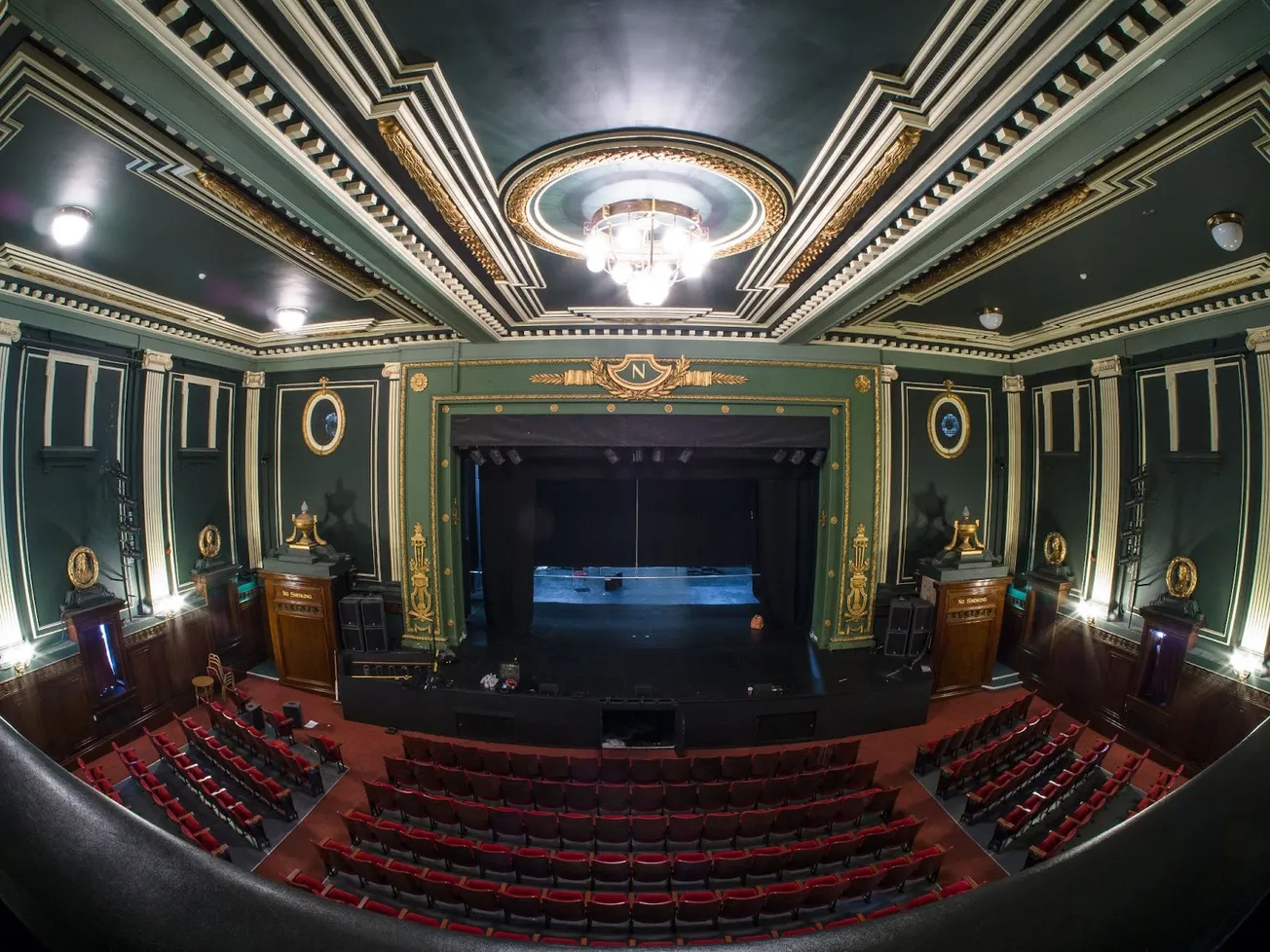The Epstein Theatre is back open for a fourth time. What’s different now?

We speak to returning artistic director Anthony Proctor-Williams about the beloved venue’s past, present and future
Dear readers — when the Epstein Theatre closed its doors in 2023, the response was an upswell of enthusiasm for the venue and dismay over its apparent demise. Some 30,000 people signed a petition to keep it open, local stars of stage and screen railed against its closure, and the Liberal Democrat opposition demanded the Labour-led city council resume its funding. Even beyond Merseyside, the Theatres Trust added the Epstein to its “At Risk” register of venues that are in danger of structural or damage or disrepair.
This backlash is easily understood. But was it proportionate? Had we really been cherishing the Epstein when it was open? After all, Liverpool Council had been subsidising the Epstein to the tune of £100,000 a year.
Well, sometimes you don’t know what you got ‘til it’s gone, as Joni Mitchell sang. And instead of paving paradise and putting up a parking lot, a fate that infamously befell the original Cavern Club, the city has now welcomed the Epstein Theatre back. In March, it was announced that new leaseholders had been found, and a £1 million remodelling job would get the theatre ready for a grand return.
But as The Post asked back in February, when the Epstein’s fate still hung in the balance, what’s to stop the same thing happening again? After all, 2023 was not the first time the theatre had diced with demolition. For your latest edition of Answers in The Post, Laurence went to Hanover Street to find out whether the 112-year-old theatre’s latest incarnation is going to stick around.
But first, your regularly scheduled Post briefing.
Your Post briefing
“Now make certain when you write this up it’s not about fucking Joe Anderson or Paul Flanagan,” former Unite boss Len McCluskey told us in an interview back in 2022. Well…sorry, Len. An internal inquiry by Unite Union has found that under McCluskey’s control, Unite was overcharged at least £30 million by Liverpool company the Flanagan Group for work on the Birmingham hotel and conference centre project. This includes in one instance paying over £1.3 million for work that should have cost £90,000. The report also found that McClusky “overruled” advice from staff and lawyers in signing the construction contract with the Flanagans — whom he previously described as friends — as well as accepting private jet flights and football tickets “consistently organised and paid for” by the Flanagans. In response to the report, McCluskey denied he ignored advice from staff and lawyers, and said to his recollection, he always paid for his own travel and football tickets. The Flanagans did not respond to requests for comment. Read the full report by the BBC here. Have any information about this story? Email abi@livpost.co.uk.
And the news keeps on coming. Over in Birmingham (again), council commissioner Max Caller has abruptly resigned. The name is all too familiar to folks in Liverpool: Caller was first appointed as a commissioner in Liverpool Council in 2020, and produced the now infamous Caller Report which detailed a toxic culture within the local authority — including how “dubious” contracts were regularly handed out, key records were routinely destroyed and staff were intimidated. In 2023, he was appointed to conduct a similar review of Birmingham Council, which was facing issues of governance and financial jeopardy. It is understood that Caller wrote to deputy leader Angela Rayner this week to confirm his plans for retirement — in the midst of a hugely damaging bin strike in Birmingham, which is understood to have cost the council and taxpayers £4 million.
And a St Helens man arrested for a double murder has been released on bail. The 31-year-old was arrested on Sunday in connection with the death in a fire of Sheila Jackson, 83, and her partner Peter Greener, 77. Merseyside police launched the murder inquiry after the fire on South John Street, St Helens, in the early hours of Tuesday 15 July. The couple were rescued from the house but later died in hospital — Mr Greener on Wednesday evening and Ms Jackson on Thursday morning. The police say an accelerant was used to start the fire, but have urged people not post anything speculative on social media that could jeopardise the investigation. They are also appealing for anyone with information to come forward.
Thank you for reading The Post. If you want more in-depth stories about Merseyside delivered directly to you via email, you can sign up to our free mailing list using the button below.
Newton Music Festival returns
From today’s sponsor: Fancy a summer weekend of DJs, bands and festival fun? Newton Music Festival is offering just that from Friday 1st to Sunday 3rd August. The lineup includes Dave Haslam on Friday, The K’s on Saturday, and Flash (a Queen tribute band) on Sunday, and is set to repeat the incredible success of last year’s festival. Hosted in the beautiful Mesnes Park, just a 15 minute train from Lime Street, Newton Music Festival has something for everyone. Day tickets start at £15 and Post readers can get an exclusive 10% discount using the code ‘1qjpad’ – click below to book.
For today’s Answers in The Post, Laurence went to the Epstein to find out whether the 112-year-old theatre’s latest incarnation is built to last.
Why is the Epstein Theatre a big deal?
The Epstein began life in 1913 as the Crane Music Hall, opened above the Crane brothers’ music emporium on Hanover Street. Over the years, it would evolve from a music hall into a venue for dance and dramatic productions, becoming the Crane Theatre in 1938, and would later host exhibitions and comedy. By its 2023 closure, the Epstein was a 110-year-old staple of the city’s vaunted performance arts scene.
When the Theatres Trust added the venue to its “At Risk” register, they expressed concern for both the venue and its architecture. Set in the Grade-II listed Hanover House – a handsome brick and stone building designed by none other than Royal Liver Building architect Walter Aubrey Thomas, the Epstein was a tone-setter of an institution: both for Liverpool’s theatre ecosystem, and for Hanover Street, sloping down to link the city’s centre with its famous waterfront. In short, it’s a landmark: in more ways than one.
Hasn’t it closed before?
Well remembered! Especially if you recall that theatre first faced existential peril in the 1960s. By ’67, the city council’s predecessor, the Liverpool Corporation, had to buy out the Crane Theatre. The hall was renamed the Neptune after the city’s maritime links, and the idea was a kind of people’s theatre: run by Liverpool people for Liverpool people.
But in 1993, the theatre was in trouble again, saved only by a popular outcry and a fund-raising pantomime. Just like in 2023, celebrities joined the efforts, including British stage and screen doyenne Judi Dench. In 1975, Dench – who had sentimental connections to Liverpool, having started her career at the Royal Court – had appeared at the Neptune in Patrick Garland's play The War Between Men and Women.
The Neptune shuttered in 2005 due to health and safety, reopening six years and a million-pound refurb later as “the Epstein” after the Beatles’ manager Brian. The opening shows were two gigs by Echo and the Bunnymen’s Ian McCulloch, followed by a two-hander charting Brian Epstein's adult life and career by playwright Andrew Sherlock. At the time, it felt like a bright future lay ahead for the beloved venue.
So why did it close in 2023?
Liverpool deserves great journalism. You can help make it happen.
You're halfway there, the rest of the story is behind this paywall. Join the Post for full access to local news that matters, just £7/month.
SubscribeAlready have an account? Sign In


Latest
A postcard from Colwyn Bay
Fountains, Ffrith and turning the place over
Just what is happening with Peak Cluster’s CO₂ pipeline?
A ‘stitch up’? How Wirral council bungled Big Heritage
The Epstein Theatre is back open for a fourth time. What’s different now?
We speak to returning artistic director Anthony Proctor-Williams about the beloved venue’s past, present and future